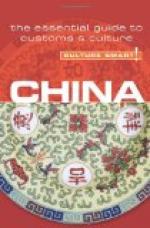|
This section contains 778 words (approx. 3 pages at 300 words per page) |

|
Traditional China in Conflict with the West
Summary: An analysis of traditional Chinese culture indicates the degree to which it conflicted with Western ideology and the reasons why. Drawing its hierarchical social structure and system of government from elements of Confucianism, traditional China was an inward-looking, inflexible society that developed uniquely as a result of China's isolation from the rest of the world.
Traditional China was made up of many key aspects. Through analysis of these key features relations and links can be made to why they may have conflicted with western ideology. The ideology of Traditional China based heavily around Confucianism, concerning a code of conduct and pre-set relations between social groups and individuals. This links with the social structure or hierarchy, which stems from the relative practices followed in a family environment. Also the economy and government reflected an inward looking attitude that was encouraged by China's isolation.
The main element of traditional China that had an impact on all other aspects of life was Confucianism. Confucianism drew its roots from the teachings of the philosopher Confucius; it defined relations between social groups and between groups and individuals. It developed a system of obligations that set strict personal code for Chinese individuals to follow. This `way of life' taught...
|
This section contains 778 words (approx. 3 pages at 300 words per page) |

|


